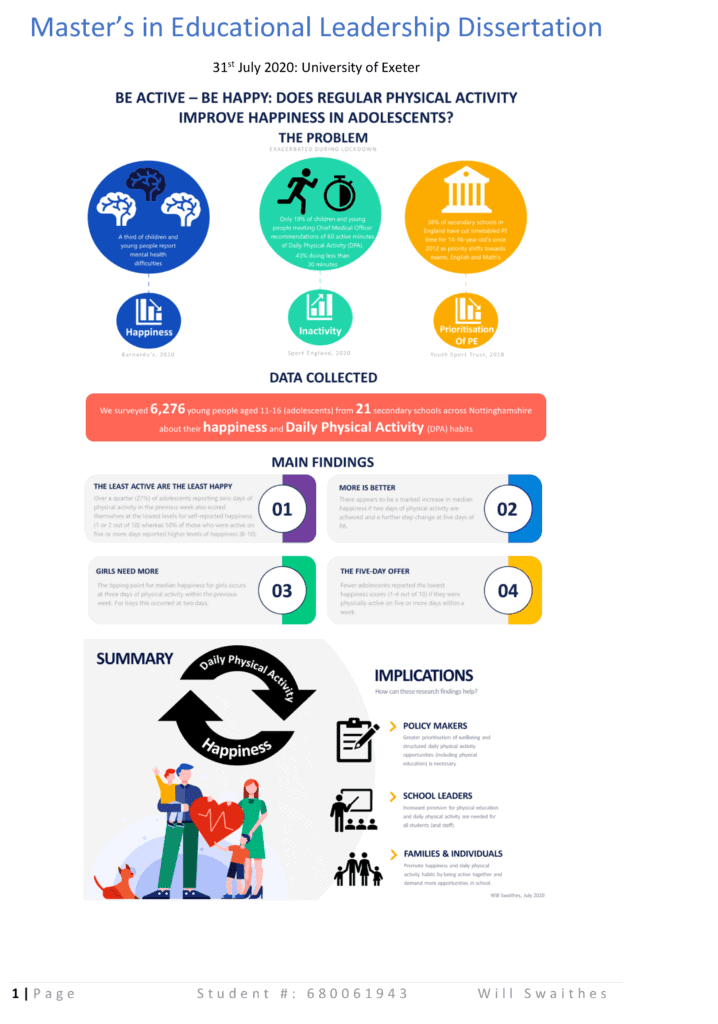
Be Active – Be Happy: Does Regular Physical Activity Improve Happiness In Adolescents?
Abstract
Background
Research suggests a positive relationship between daily physical activity (DPA) and happiness. However, a lack of research on DPA and happiness of adolescents in England exists. This work explores the relationship between physical activity and happiness in adolescents in England.
This research aims to:
- Better understand the effect of physical activity on health, happiness and success in schools
- Influence school leaders and policy makers to increase daily provision for physical activity
- Influence student habits by raising their awareness of the value of physical activity.
Methods
An online survey was used to capture self-reported happiness and physical activity behaviours amongst 6,276 adolescents in Year 7-11 (11 to 16-year olds) from 21 secondary schools across Nottinghamshire. Data were analysed descriptively using Microsoft Excel.
Results
Findings demonstrated similar trends to national data around both DPA and happiness declining with age, especially for girls. In addition, the following results were shown:
- Over a quarter (27%) of individuals reporting zero days of physical activity in the last week also scored themselves at the lowest levels for self-reported happiness (1 and 2 out of 10 on a Likert scale) whereas over 50% of those who were active on 5 or more days reported much higher happiness ratings of 8-10
- There appears to be a marked increase in median happiness if two days of physical activity are achieved and a further step change at five days of PA
- The tipping point of median happiness for girls requires more DPA than for boys, as this appears to happen at three days rather than two
- Being physically active on five days a week results in the least adolescents reporting the lowest happiness scores (1-4 out of 10) but being active every day could be associated with lower self-reported happiness (especially for girls).
Conclusion
This study has provided evidence which may be of benefit to students, staff, parents, school leaders and educational policy makers in influencing activity habits and educational provision for adolescents. Implications for practice relate to the need for more structured opportunities to embed DPA within the school curriculum. This is especially important for older students and girls, where there are particular challenges around meeting Chief Medical Officer guidelines, their happiness and marginalised physical education time in many schools. Further work is needed to better understand the impact of physical activity interventions, especially for those self-reporting low levels of happiness, and other possible causal factors.
Read the Full Research Report
If you would like to read the full research report please download the dissertation via the link below:
Education Leadership Dissertation Will Swaithes July 2020
About the Author
Will Swaithes has over 20 years’ experience in education. As a teacher, teacher educator, school leader and mentor of teaching and learning he achieved Advanced Skills Teacher status in 2008 before becoming a Specialist Leader of Education in 2012. As an Assistant Head for Teaching and Learning, he introduced a life skills curriculum and has always been passionate about using active learning and the lessons and opportunities that can be learnt from physical activity and sport to improve the wellbeing of all children. Will also spent 4 years as Head of PE and Achievement for the Youth Sport Trust and continues to author and deliver training for them as well as working closely with Loughborough University, University of Buckingham and PE departments across the country keen to transform their offer to have more value and purpose. This research was conducted as part of his MA in Education with Exeter University.


[…] published my Masters dissertation research project ‘exploring physical activity and happiness in adolescents’ which has been a really interesting look into habits and attitudes across a group of Nottinghamshire […]
[…] are so many reasons to build healthy exercise habits into your daily routine and my recent masters level research definitely demonstrated the importance of daily physical activity (DPA) to improve happiness. […]